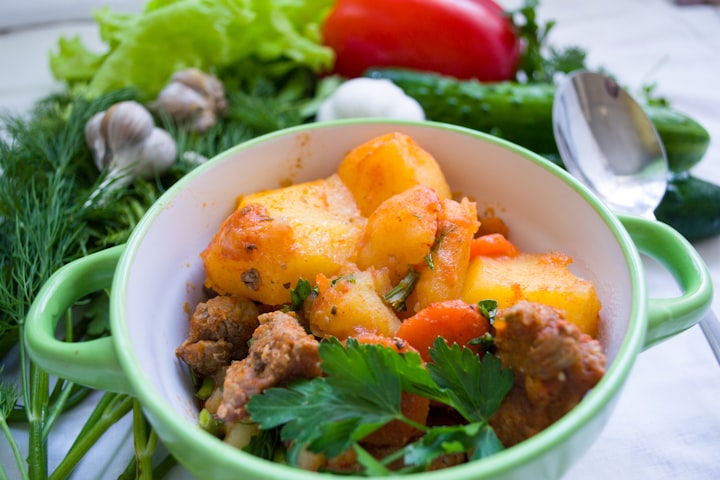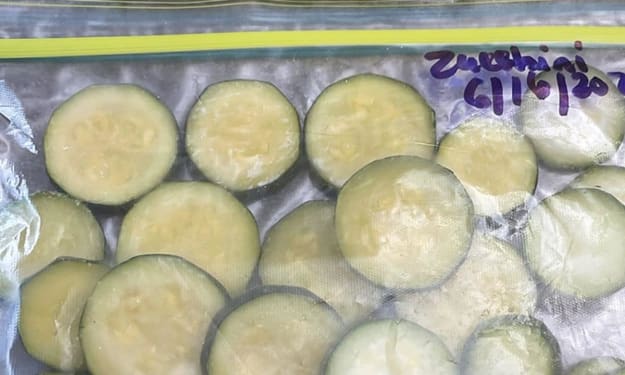How Long Do Cooked Veggies Last in the Fridge?
How Long Do Cooked Veggies Last in the Fridge? Your Ultimate Guide to Vegetable Storage

Your Ultimate Guide to Vegetable Storage
Have you ever wondered how long those delicious cooked veggies will last in your fridge? Proper food storage is essential to maintain freshness, flavor, and nutritional value. In this comprehensive guide, we'll explore the shelf life of cooked vegetables and provide practical tips to maximize their lifespan in the refrigerator. Let's dive in and discover how to keep your cooked veggies fresh for as long as possible!
Why Proper Storage Matters
Properly storing cooked vegetables is crucial to maintain their quality and minimize the risk of foodborne illnesses. When cooked veggies are exposed to air, moisture, and temperature fluctuations, they can quickly spoil, lose texture, and develop harmful bacteria. By following recommended storage techniques, you can ensure your vegetables stay fresh, flavorful, and safe to consume.
How Long Can You Keep Cooked Veggies in the Fridge?
The shelf life of cooked vegetables in the fridge can vary depending on multiple factors, such as the vegetable type, cooking method, and storage conditions. In general, most cooked veggies can last between 3 to 7 days when properly refrigerated. However, some vegetables may last slightly longer or shorter periods. Let's explore the expected shelf life of commonly cooked vegetables:
Shelf Life of Common Cooked Vegetables
Here's an overview of the approximate refrigerator shelf life for various cooked vegetables:
- Vegetable Shelf Life (Refrigerated)
- Broccoli 3-5 days
- Carrots 5-7 days
- Cauliflower 3-5 days
- Green Beans 3-5 days
- Peas 3-5 days
- Brussels Sprouts 3-5 days
- Spinach 3-5 days
- Asparagus 3-4 days
- Bell Peppers 3-5 days
- Zucchini 3-5 days
- Corn 3-4 days
- Potatoes 3-5 days
Keep in mind that these timeframes are approximate and can vary based on individual circumstances. It's essential to consider other factors that can affect the shelf life of cooked vegetables.
Factors Affecting Shelf Life
Several factors influence how long cooked vegetables can last in the refrigerator. Understanding these factors will help you make informed decisions about vegetable storage and minimize food waste. Here are some key factors to consider:
- Vegetable Type: Different vegetables have varying moisture levels and structures, affecting their perishability. Leafy greens like spinach and lettuce tend to wilt faster than heartier vegetables like carrots and potatoes.
- Cooking Method: The cooking method used can impact the shelf life of cooked vegetables. Overcooking can lead to faster deterioration, while blanching or lightly steaming may help retain freshness.
- Storage Containers: The type of container you use to store cooked vegetables plays a vital role in preserving their quality. Opt for airtight containers or resealable bags to minimize exposure to air and moisture.
- Temperature: Maintaining a consistent refrigerator temperature is crucial. The FDA recommends a refrigerator temperature of 40°F (4°C) or below to inhibit bacterial growth and extend the shelf life of cooked veggies.
- Initial Freshness: The quality of vegetables before cooking can impact how long they will last after being cooked. Using fresh, high-quality produce is always beneficial in terms of taste and shelf life.
By considering these factors, you can make informed decisions about storing your cooked vegetables and ensure they stay fresh for as long as possible.
Tips for Extending the Shelf Life
Now that we understand the basics, let's explore some practical tips to help extend the shelf life of your cooked vegetables in the fridge:
- Cool Quickly: After cooking, allow your vegetables to cool down to room temperature before transferring them to the refrigerator. Rapid cooling helps prevent bacterial growth and prolongs freshness.
- Divide into Portions: Instead of storing all your cooked vegetables in a single container, divide them into smaller portions. This way, you can take out only what you need, reducing the risk of contamination and preventing unnecessary reheating.
- Label and Date: To keep track of freshness, label each container with the contents and date of preparation. This practice will help you prioritize which cooked vegetables to consume first and avoid wastage.
- Avoid Condensation: Moisture is an enemy of food freshness. Place a paper towel or a clean cloth in the container to absorb excess moisture and prevent condensation, which can lead to spoilage.
- Use Transparent Containers: Opt for transparent containers or resealable bags when storing cooked vegetables. This allows you to easily identify their contents without opening the container, reducing exposure to air.
- Store Away from Ethylene Producers: Some fruits, like bananas and apples, release a natural ripening agent called ethylene, which can speed up the spoilage of vegetables. Keep your cooked veggies away from ethylene-producing fruits to prolong their shelf life.
- Practice FIFO: FIFO stands for "First In, First Out." When storing multiple batches of cooked vegetables, consume the older ones first. This rotation ensures you use the vegetables before they reach their expiration date.
- Avoid Excessive Seasoning: While seasonings add flavor, excessive salt, spices, and sauces can impact the shelf life of cooked vegetables. Consider adding seasoning when reheating rather than during initial preparation.
By following these tips, you can significantly extend the shelf life of your cooked vegetables and minimize food waste.
Signs of Spoilage
It's essential to recognize the signs of spoiled cooked vegetables to ensure your safety and avoid consuming potentially harmful food. Here are common indicators that your cooked veggies have gone bad:
- Off Odor: If your cooked vegetables emit an unpleasant or rancid odor, it's a clear sign of spoilage. Trust your sense of smell and discard any vegetables with an off smell.
- Mold: Mold growth is an obvious sign that your cooked vegetables are no longer safe to eat. Discard any vegetables showing signs of mold, as consuming mold can lead to health issues.
- Slimy Texture: If your cooked veggies develop a slimy or sticky texture, it's a strong indicator of bacterial growth. The sliminess is caused by the breakdown of vegetable cells, and such vegetables should be discarded.
- Visible Discoloration: Noticeable changes in color, such as browning, yellowing, or dark spots, can indicate spoilage. Fresh vegetables maintain vibrant colors, so any discoloration is a sign of deterioration.
If you observe any of these signs, it's best to err on the side of caution and discard the cooked vegetables. Consuming spoiled food can lead to food poisoning and other health complications.
Proper Storage Techniques

To maximize the shelf life of your cooked vegetables in the fridge, it's crucial to follow proper storage techniques. Here are some guidelines to ensure optimal storage:
- Cool Before Refrigeration: Allow your cooked vegetables to cool down for approximately 2 hours at room temperature before transferring them to the refrigerator. This prevents condensation and bacterial growth.
- Divide into Portions: As mentioned earlier, divide your cooked vegetables into smaller portions before storing them. This reduces the risk of contamination and allows for easier reheating of desired quantities.
- Airtight Containers: Opt for airtight containers or resealable bags to store your cooked veggies. Make sure they are properly sealed to minimize air exposure and moisture.
- Avoid Overpacking: Do not overcrowd your storage containers. Leave some space for air circulation, which helps maintain freshness and prevents the buildup of excess moisture.
- Refrigerator Placement: Store your cooked vegetables on the middle or lower shelves of the refrigerator. These areas maintain a more consistent temperature compared to the door or top shelves.
- Avoid Frequent Opening: Every time you open the refrigerator door, the temperature fluctuates, potentially compromising the freshness of your cooked vegetables. Minimize opening the refrigerator door unnecessarily.
By following these storage techniques, you can optimize the lifespan of your cooked vegetables and enjoy them at their best quality.
FAQs -
Can I freeze cooked vegetables?
Yes, you can freeze cooked vegetables to extend their shelf life further. Freezing preserves the quality and nutrients of vegetables, although the texture may slightly change upon thawing. Ensure the cooked vegetables are properly cooled before transferring them to freezer-safe containers or bags. Label the containers with the contents and date before placing them in the freezer. Cooked vegetables can last in the freezer for approximately 8 to 12 months.
Can I store cooked veggies in an airtight container?
Absolutely! Storing cooked veggies in airtight containers is highly recommended. Airtight containers prevent air exposure, which slows down the oxidation process and helps retain freshness. Make sure the containers are clean and properly sealed to maintain optimal storage conditions.
Can I reheat cooked vegetables more than once?
It's generally safe to reheat cooked vegetables multiple times as long as you follow proper reheating techniques. When reheating, ensure the vegetables reach an internal temperature of 165°F (74°C) to kill any potential bacteria. However, repeatedly reheating can impact the texture and taste of the vegetables, so it's advisable to only reheat the quantity you plan to consume.
What are the best ways to use leftover cooked vegetables?
Leftover cooked vegetables can be incredibly versatile. Consider incorporating them into various dishes, such as soups, stews, stir-fries, omelets, or grain bowls. They can also be blended into sauces, dips, or added to sandwiches and wraps for added nutrition and flavor. Get creative and experiment with different recipes to enjoy your leftovers to the fullest.
Can I store different types of cooked vegetables together?
Yes, you can store different types of cooked vegetables together as long as they have similar shelf lives. Combining vegetables with varying storage times may result in some vegetables spoiling before others. If storing different types together, prioritize consuming the vegetables with the shortest shelf life first.
How long can I store cooked veggies at room temperature?
It is not recommended to store cooked vegetables at room temperature for an extended period. Bacteria can multiply rapidly in the temperature danger zone of 40°F to 140°F (4°C to 60°C), leading to potential foodborne illnesses. Cooked vegetables should be refrigerated within two hours of cooking to ensure their safety and freshness.
Are there any vegetables that last longer than others when cooked?
Yes, some vegetables tend to have a longer shelf life when cooked. Root vegetables like carrots and potatoes, as well as cruciferous vegetables like broccoli and Brussels sprouts, generally have a longer storage period compared to leafy greens or tender vegetables like peas. However, proper storage practices still apply to maximize their freshness.
What is the ideal temperature for storing cooked vegetables in the fridge?
The ideal temperature for storing cooked vegetables in the refrigerator is 40°F (4°C) or below. This temperature inhibits bacterial growth and helps maintain the quality and safety of the vegetables. Ensure your refrigerator is set to the proper temperature for optimal storage conditions.
Is it safe to eat cooked vegetables after their recommended storage time?
While cooked vegetables may still be safe to consume after their recommended storage time, their quality and flavor may deteriorate. It's best to adhere to the recommended storage guidelines to ensure the best taste and nutritional value. If in doubt, trust your senses and discard cooked vegetables that show signs of spoilage.
Can I use the same storage guidelines for canned cooked vegetables?
Canned cooked vegetables typically have a longer shelf life compared to homemade cooked vegetables. Follow the storage guidelines provided on the canned vegetable's packaging for optimal freshness. Once opened, transfer any unused portion to a suitable container and refrigerate according to the recommended storage time.
What is the difference in shelf life between raw and cooked vegetables?
In general, raw vegetables have a longer shelf life compared to cooked vegetables. Cooking alters the texture and moisture content of vegetables, making them more susceptible to spoilage. Raw vegetables can last anywhere from a few days to a few weeks, depending on the specific vegetable and storage conditions.
Can I store cooked vegetables in the freezer if I don't plan to eat them soon?
Yes, freezing is an excellent option for storing cooked vegetables for an extended period. Freezing helps preserve the quality and nutritional value of the vegetables. Ensure the cooked vegetables are properly cooled before transferring them to freezer-safe containers or bags. Label the containers with the contents and date before placing them in the freezer. Cooked vegetables can last in the freezer for approximately 8 to 12 months.
Are there any vegetables that should not be cooked and stored for later consumption?
Certain vegetables are better suited for immediate consumption and do not fare well when cooked and stored for later consumption. Vegetables with high water content, such as lettuce, cucumbers, and tomatoes, tend to wilt or become mushy when cooked and refrigerated. These vegetables are best enjoyed fresh and should be avoided for long-term storage after cooking.
Understanding how long cooked vegetables last in the fridge is essential for maintaining their quality, flavor, and nutritional value. By following proper storage techniques, you can extend their shelf life and reduce food waste. Remember to consider the vegetable type, cooking method, and storage conditions when determining the optimal storage time. When in doubt, trust your senses and discard any cooked vegetables showing signs of spoilage. Enjoy the deliciousness and health benefits of cooked veggies while they're at their freshest!
About the Creator
CityStateInfo (New Media)
I am an ambitious and creative content creator passionate about engaging content that resonates with audiences.
My work is driven by my belief in the power of storytelling to educate and inform people about important topics.





Comments
There are no comments for this story
Be the first to respond and start the conversation.